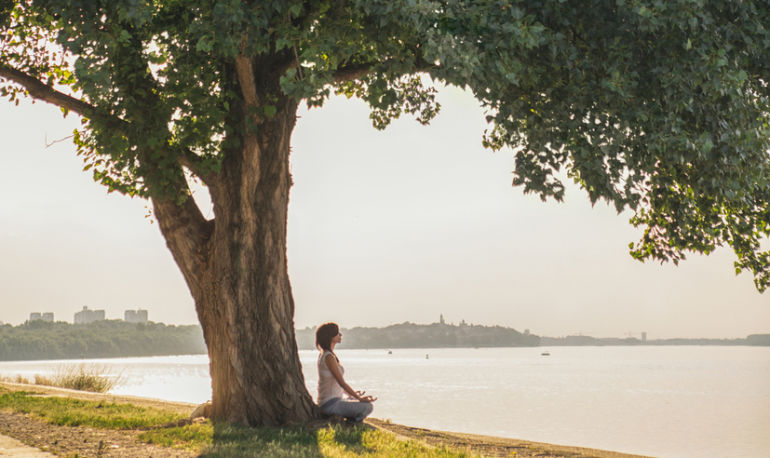
I stopped her in the middle of our hike. "Relax," I said. "Take a few deep breaths. Can you feel the breeze? Can you feel the presence of the trees and mountains?"
"Yes. Yes, I can," she said. It seemed like she was sinking into a deep abyss.
I smiled and said to her, "Now you are meditating!"
Meditation isn't some complicated phenomenon. If it seems complicated, then you're probably taking it too seriously. Meditation is a state of relaxation wherein you experience your awareness and become a witness to all of your thoughts, emotions, and inner chatter.
These five tips are all you need to get started on your meditation journey:
1. Relax.
Before you learn to meditate, you need to learn to relax. Hopefully that won't be too tough! You can relax by reading, writing, listening to music, or simply sitting in nature near a tree or a beach. Whatever relaxes you, go for it. Meditation begins with the relaxation of your mind, body, and soul. Start carving out some time every day to do nothing but relax.
2. Don't fight your thoughts.
As you begin to meditate, your thoughts will certainly try to bother you. Meditation creates an outlet for our thoughts to exit our minds. Of course, these thoughts don't always leave so smoothly. They may create some havoc and uneasiness, but if you fight with them, they won't leave. Instead, simply watch your thoughts and be mindful of each one as it passes by. Don't accept or reject any of them. Continue to witness your thoughts, and eventually you will experience stillness.
3. Listen to music, or sit in silence. It's your call.
Some meditators slip into calmness in complete silence while others need the support of music. Both ways are fine! Tap into what works for you. If you want to meditate with music, I suggest using a natural soundtrack of singing bowls, waterfalls, or bird chirps. Music can play a significant role in moving you toward a meditative state.
4. Choose a mantra.
A mantra is a sacred sound that helps you connect with your higher self. Preferably, you should receive a personal mantra from a guru or a spiritual teacher. But to start, there are many universal mantras that you can use as a beginner. A YouTube search for "gayatri mantra" (mantra for wisdom) or "shanti mantra" (mantra for peace) will lead you to many soothing sounds. In addition, you can always choose a statement in English to repeat, such as I am pure awareness orI witness my consciousness.
5. The right questions matter.
While there are no right answers when it comes to spirituality, there are certainly right questions. Many seekers find it beneficial to focus on a specific question when meditating.
Being mindful of questions in meditation can help unearth many deep-rooted layers of conditioning. Some of the questions that you can ask yourself are:
- Who am I?
- Where am I coming from?
- Where am I going?
- What do I want?
Relax. Sit with your spine erect. Close your eyes. Gently bring your awareness to your navel center. Stay there for a while. Now, slowly inhale, hold, and exhale. Continue to do this for about five minutes. Thereafter, sink deeper in your stillness. Continue to observe your presence for about five more minutes. Gently open your eyes and sit in silence for a minute before moving on.

No comments:
Post a Comment